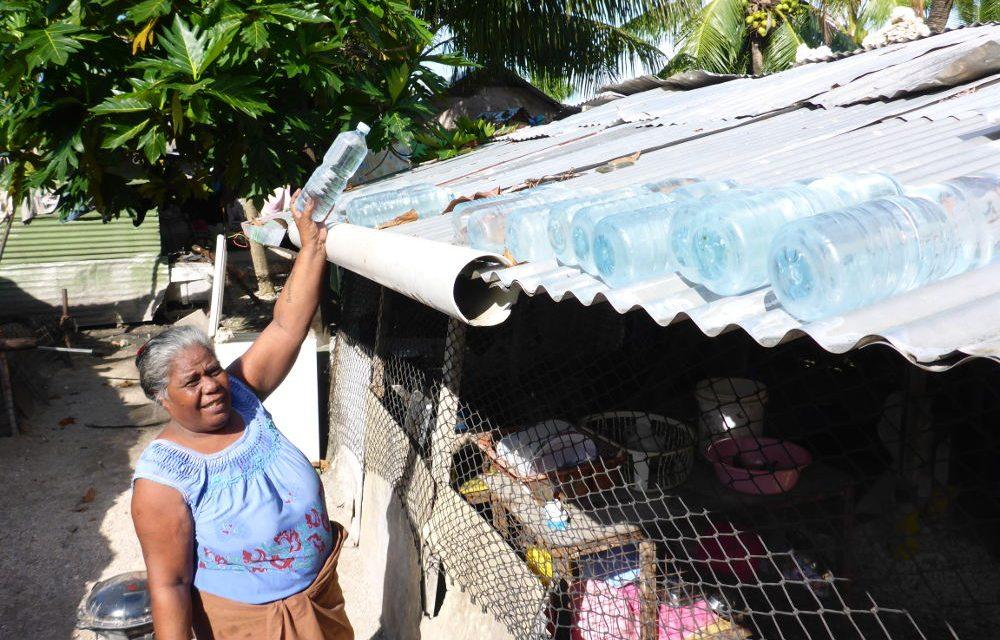In Kiribati, people are learning about a simple way to disinfect drinking water
Increasingly variable rainfall is affecting water supplies in Kiribati, compromising health and hygiene, and boosting the risk of diarrhoeal disease. A low-cost solar method is proving effective in disinfecting contaminated water.
Solar Disinfection of Water (SODIS) is a simple method to disinfect contaminated drinking water. Endorsed by the World Health Organization (WHO) in 2000, it is used globally by more than 10 million people, but is relatively new to the Pacific region.
SODIS involves exposing water to the sun in clear bottles on a reflective surface for six hours. The combined effect of ultraviolet radiation and heat from the sun results in water that is safe for consumption.
In Kiribati, diarrhoea and other waterborne diseases contribute to high child mortality rates, with 63 out of every 1000 children dying before their fifth birthday.
To respond to these risks, the Pacific Community (SPC) has been involved in activities to reduce diarrhoeal disease in children. The work is spearheaded by a European Union through its Global Climate Change Alliance: Pacific Small Island States (GCCA: PSIS) project, implemented by the SPC with the Environmental Health Unit of the Kiribati Ministry of Health and Medical Services (MHMS) and the Office of Te Beretitenti (the President).
Key to these activities is the introduction of SODIS. First, a study was conducted, funded by the German Agency for International Cooperation. “We have found out that the SODIS method is as good as boiling water for disinfection purposes,” said GCCA: PSIS Project Officer in Kiribati, Tianuare Taeuea. “It is simpler, cheaper, reliable, less time consuming, provides job opportunities, and even tastes better. But the overall driver for our families to use SODIS is to improve their health,” he said.
A six-month mini-campaign, entitled ‘SODIS – Cheap – Simple – Safe’, was held in Kawan Bairiki community, a low income and densely populated area of South Tarawa. Here water sources are often contaminated with bacteria, and families struggle to secure safe drinking water.
Community campaign leader, Teretia Tabutoa, said SODIS significantly decreased the number of diarrhoeal and respiratory diseases across the community, especially among women and children. “This makes a huge difference in our lives, as our families are happier and healthier and our children are able to attend school much more regularly,” said Ms Tabutoa. Bairiki residents also reported savings of up to AUD 300 per household per year as they no longer need to boil water for sterilisation.
“Based on the research and the campaign in the Bairiki community, we now know that SODIS works to curb diarrheal diseases,” said Tebikau Tibwe, Chief Health Inspector, Environmental Health Unit. “Rolling out the campaign nationally is a huge endeavour, and one that requires extensive support and partnerships at all levels,” he said.
SODIS is being rolled out across the region with the help of SPC, World Health Organization (WHO) and UNICEF, among others.
Highlights:
- SODIS is a low cost disinfection method that involves exposing water to the sun in clear bottles on a reflective surface for six hours
- It is endorsed by the World Health Organisation and used globally by more than 10 million people, with SPC involved in assisting its uptake in the Pacific
- In the first year using SODIS, Kiribati saw notable reductions in diarrhoea, particularly in children aged under five years
Usefull links:
Learn more about SODIS
